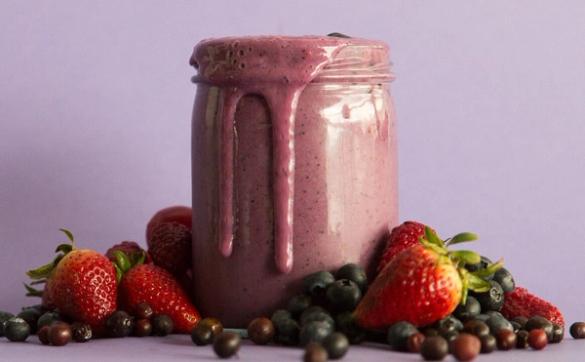9 Foods for optimal mental health + mood

Today, doctors, therapists, and dietitians understand the importance that food plays not only in physical well-being, but also in maintaining a healthy mood. For over a decade now, scientific studies have pointed to the connection between your gut and your brain, and the impact that your diet can have on your day to day emotional state.
In one of the most well-known examples, about ten years ago a groundbreaking study found that women who ate a Mediterranean-style diet high in fruits, veggies, whole grains, and fish (with only moderate red meat) had better moods compared to those who ate diets high in refined carbs and added sugar. Since then, several other trials have validated the various ways in which food can impact mood.
Below, learn how you can structure your diet to support mental health, plus specific foods with mood-boosting properties.

What does a mood-boosting diet look like?
There’s no hard and fast set of rules, but as of right now, most of the research has been done on Mediterranean-style diets—eating patterns that emphasizes veggies, fruits, legumes, whole grains, nuts, seeds, olive oil, fish, fermented foods, and some meat and dairy, while limiting sugars, refined carbs, and processed foods.
A mood-supporting diet should also contain sufficient levels of all essential nutrients as well as fiber, probiotics, and polyphenols. Specific foods have been associated with an elevated mental state, too, especially when eaten in the context of an overall nutritious diet. Discover some below!

9 legitimately mood-boosting foods
1. Fatty fish
Fatty fish such as salmon, sardines, mackerel, and anchovies are rich in the long-chain omega-3 fatty acids EPA and DHA. Omega-3s are important components of brain cell membranes and they play a role in regulating cell signaling within dopamine and serotonin pathways, which may contribute to their positive effect on mood.
2. Nuts and seeds
Nuts and seeds are jam-packed with healthy fats. In fact, chia seeds, flaxseeds, and sacha inchi are top sources of alpha-linolenic acid (ALA), a plant-based omega-3 that’s converted into longer-chain omega-3s in the body.
Many nuts and seeds are also potent sources of the minerals zinc, selenium, magnesium, and iron. Getting the recommended daily amount of these minerals helps support a healthy nervous system and cognitive function.

3. Probiotic-rich fermented foods
Kombucha, kefir, kimchi, and yogurt are fermented foods containing live probiotic bacteria, which can help fortify your gut microbiome. This is important, since emerging research suggests there’s quite a bit of cross-talk between the gut and the brain via the gut-brain axis. The gut also produces a large percentage of the body’s serotonin, so it’s really in your best interest to keep it healthy!
4. Legumes (beans, lentils, chickpeas)
Fiber-rich plant foods like beans and lentils are naturally packed with fiber—1 cup of cooked lentils packs 16 grams of fiber, which is 64% of your daily value—and fiber is the fuel your good gut bacteria need in order to thrive! As mentioned above, a well functioning gut microbiome is key for healthy communication between the gut and brain. Beans and legumes are also a great source of mood-supporting potassium, magnesium, zinc, folate, B vitamins, and zinc.

5. Berries
Berries are a rich source of anthocyanins, a type of polyphenol that combats oxidative stress, supports brain health, and has been associated with better mood. Berries are also packed with fiber and vitamin C which is an antioxidant that helps maintain the integrity and function of nerve cells.
6. Dark leafy greens
Kale, spinach, arugula, Swiss chard, and other dark leafy greens pack the biggest bang for your nutritional buck. They share many of the same mood-boosting nutrients as berries, including fiber, vitamin C, and polyphenols. They’re also a good source of B vitamins (particularly folate), vitamin A, and minerals such as potassium, magnesium, and iron, which work together to support optimal mental health. Iron, for example, helps support a healthy mood, focus, and energy levels by aiding in the transport of oxygen throughout the body, including to the brain.

7. Avocado
Imbalanced blood sugar can lead to spikes and dips in energy levels, which make you more prone to feeling anxious. Two big nutrients that slow the absorption of sugar and maintain stable blood sugar levels are healthy fats and fiber—and avocado is absolutely packed with them. One avocado contains 20+ grams of fat (mostly healthy monounsaturated fats) and 13 grams of fiber. Plus, avocado packs 14% of your daily value for calming magnesium.
8. Chili pepper
Spices and herbs can be a simple way to ramp up the flavor and mood-boosting potential of your meal. In general, herbs and spices tend to be a great source of beneficial polyphenols.

9. Dark chocolate
There’s a reason you might start to crave chocolate when you’re stressed. Dark chocolate and cocoa powder are a great source of magnesium—an essential mineral that relaxes your body and plays a vital role in healthy nervous system functioning. Dark chocolate is also a source of polyphenols (called flavonoids) and the serotonin-precursor tryptophan, which support cognitive health and mood.
Bottom line:
There are clear correlations between what we eat and how we feel, both physically and mentally, and exciting research suggests that a nutrient-dense, minimally processed diet (such as the Mediterranean diet) helps support optimal mood.










